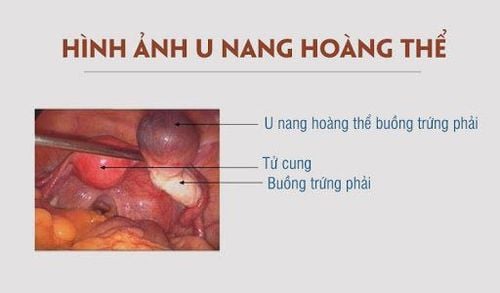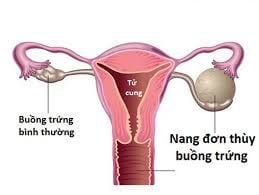This is an automatically translated article.
The article was professionally consulted by Master Nguyen Thi Nhu Trang - Reproductive Support Center - Vinmec Times City International HospitalLuteal cyst is a fairly common condition in women. This condition is usually not a cause for concern, but it can also get worse, affecting the health of the pregnant woman and the fetus.
1. What is a corpus luteum cyst?
Ovarian cyst is a common disease in women of reproductive age, there are 2 types: functional ovarian tumor and actual ovarian tumor. A corpus luteum cyst is a functional ovarian tumor that is common and mostly harmless. The principle of luteal cyst formation is as follows:According to the physiological cycle of the ovary, each month, on one ovary, one follicle will be nourished and developed. Under the effect of the peak of LH (hormone of the pituitary gland), ovulation will occur, the follicle shell breaks, the ovum is released into the fallopian tube, waiting for sperm to fertilize. At this time, in the ovary, from the rest of the follicle, the corpus luteum, also known as the corpus luteum cyst, will be formed. It can be more simply understood that the luteal phase is the period after ovulation but ends before the new menstrual period. If the egg is not fertilized, the corpus luteum cyst will survive for 12 to 14 days and then degenerate, leaving a small scar on the ovary. If the egg is fertilized, the culture cells will secrete the hormone hCG (Human chorionic gonadotropin) so that the corpus luteum enlarges to become the corpus luteum of pregnancy. The corpus luteum cyst during pregnancy plays a very important role in the maintenance and development of the pregnancy. Because right from the beginning, the corpus luteum secretes the hormone progesterone - the most important hormone that helps the endometrium get ready for the embryo to implant and maintain the pregnancy. When the pregnancy is stable and larger at about 8-10 weeks, the corpus luteum will gradually degenerate. The degenerative process lasts until the end of the first 3 months of pregnancy. Because at this time, the placenta has enough capacity to replace the ovaries to secrete the necessary hormones to maintain the pregnancy. The corpus luteum cyst usually disappears on its own during the first trimester of pregnancy and does not affect the mother or the fetus. Occasionally, they can grow large, spontaneously bleed within the cyst, or cause torsion of the ovary, causing painful symptoms. When the cyst ruptures, it causes sudden and severe pain in the abdomen.

Nang hoàng thể là u buồng trứng cơ năng, là tình trạng thường gặp và đa số là vô hại
2. Do corpus luteum cysts affect fertility?
Luteal cysts usually form due to hormonal changes during pregnancy and usually disappear after the first 3 months of pregnancy. This is a benign cyst, not a cause for concern. However, luteal cysts can still affect a woman's ability to get pregnant.
For women who are not pregnant, luteal cysts on one or both ovaries are usually small, harmless, and do not affect the ability to get pregnant.
For pregnant women, the fetal growth rate is quite fast, especially in the middle stage of pregnancy. If the corpus luteum does not dissolve, it can increase the risk of miscarriage and premature birth. Some complications of luteal cysts during pregnancy are ovarian torsion, cyst rupture. However, most corpus luteum cysts pose no danger to pregnancy and do not require treatment.
When there is a corpus luteum cyst, it is necessary to closely monitor for timely intervention, especially in the first 3 months, which is the most sensitive time during pregnancy.
For mother and baby to be healthy, pregnant women need to pay attention to:
Understand early signs of pregnancy, pregnancy poisoning, bleeding during pregnancy. Timely, correct and sufficient first prenatal check-up, avoiding too early/too late. Fetal malformation screening at 12 weeks detects dangerous fetal malformations that can be intervened early. Distinguish between normal vaginal bleeding and pathological vaginal bleeding for timely intervention to maintain pregnancy. Screening for thyroid disease in the first 3 months of pregnancy avoids dangerous risks before and during delivery. Vinmec currently has many maternity packages (12-27-36 weeks), in which the 12-week maternity package helps monitor the health of mother and baby right from the beginning of pregnancy, early detection and timely intervention of health issues. In addition to the usual services, the maternity monitoring program from 12 weeks has special services that other maternity packages do not have such as: Double Test or Triple Test to screen for fetal malformations; Quantitative angiogenesis factor test for preeclampsia; thyroid screening test; Rubella test; Testing for parasites transmitted from mother to child seriously affects the baby's brain and physical development after birth.
For more information about the 12-week maternity package and registration, you can contact the clinics and hospitals of Vinmec health system nationwide.
Please dial HOTLINE for more information or register for an appointment HERE. Download MyVinmec app to make appointments faster and to manage your bookings easily.













